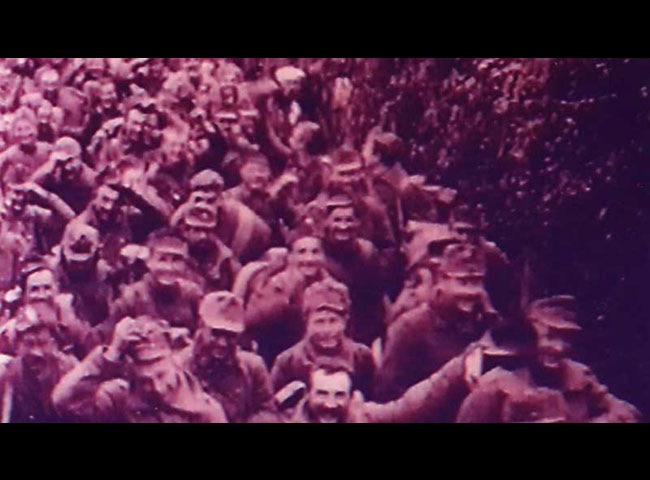Prisonniers de la guerre
-
Réalisé par Yervant Gianikian, Angela Ricci Lucchi • Écrit par Yervant Gianikian, Angela Ricci Lucchi
-
Italie • 1995 • 67 minutes • 35 mm • Couleur
- Réalisation :
Yervant Gianikian, Angela Ricci Lucchi - Écriture :
Yervant Gianikian, Angela Ricci Lucchi - Image :
Yervant Gianikian, Angela Ricci Lucchi - Son :
Yervant Gianikian, Angela Ricci Lucchi - Montage :
Yervant Gianikian, Angela Ricci Lucchi - Musique originale :
Giovanna Marini, Patrizia Polia
- Production (structure) :
Museo Storico di Trento - Coproduction :
Museo Storico Italiano della Guerra di Rovereto, Comune di Rovereto - Ayant droit :
Museo Storico di Trento
- N° ISAN :
non renseigné
Résumé
Accompagnés des lettres de captivité chantées par Giovanna Marini, des soldats de la Première Guerre mondiale convoyés vers la Sibérie forment une foule fantomatique qui glisse à travers les paysages. Ici, l’enfermement est collectif, à ciel ouvert.
Yervant Gianikian and Angela Ricci Lucchi have built up a great reputation making original, lyrical and skilful found- footage films, among them From Pole to Equator, a classic in the genre. Their latest film, Prigionieri della Guerra, about the First World War, is also made up of archive footage. The material has been taken from the archives of two of the great powers that participated in the war: Czarist Russia and the dual monarchy of the Austro-Hungarian Empire. Prigionieri della Guerra analyses and compares the military film reports of both sides about the condition of prisoners of war, civilian refugees, orphans and fallen soldiers. The film wants to provide a picture of the way in which large masses of soldiers from different ethnic backgrounds were deported to places far from their own country. For instance, the film comprises pictures of Austrian prisoners in Siberia and of a children's camp in the Austrian Oberhollabrunn, the original function of which was to show that the prisoners were being treated humanely. This contrasts with the war letters and diaries of soldiers who fought in the Austrian army. Gianikian & Ricci Lucchi analysed the pictures taken early this century by war cameras against the background of the fact that at the end of the same century, the Balkans are once again the backdrop for war. The old pictures are accompanied by vocal music specially composed for the film by Giovanna Marini.
Mot(s)-clé(s) thématique(s)
Sélections et distinctions
- 1996 • IFFR - International Film Festival Rotterdam • Rotterdam (Pays-Bas) • Sélection
Comment avoir accès au film ?
-
Édition DVD
- Il n'existe pas d'édition DVD à notre connaissance
-
Accès VOD
- Il n'existe pas d'accès en VOD à notre connaissance
- Distribution
- Aide sur les moyens d'accéder à un film
